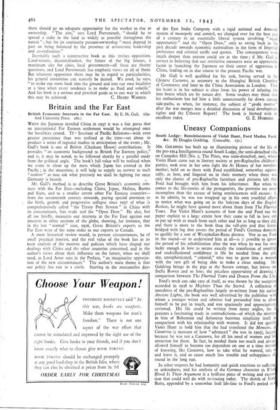Britain and the Far East
British Economic Interests in the Far East. By E. M. Gull. (Ox- ford University Press. 16s.) WHEN the Japanese invaded China in 1937 it was a fair guess that an international Far Eastern settlement would be attempted once the hostilities ceased. Th° Institute of Pacific Relations—with even greater prescience than was realised at the time—set about to produce a series of regional studies in anticipation of the event ; Mr. Gull's book is one of British (Chatham House) contributions. It provides " an economic background to British Far Eastern policy," and is, it may be noted, to be followed shortly by a parallel study from the political angle. The book's full value will be realised when we come to clean up the mess which Japan has created in the Pacific ; in the meantime, it will help to supply an answer to such " realists " as may ask what precisely we shall be fighting for once Germany is beaten.
Mr. Gull's method is to describe Great Britain's economic con- tacts with the Far East—including China; Japan, Malaya, Burma and Siam, and to a smaller extent other Far Eastern countries— from the seventeenth century onwards, paying special attention to the birth, growth and progressive collapse since 1937 of what is comprehensively called " the Treaty Port System " in China with its concomitants, free trade and the " Open Door." He also, but all too briefly, measures our interests in the Far East against our interests in other sections of the globe, showing, for instance, that in the last " normal year, 1936, Great Britain's exports to the Far East were of the same order. as our exports to Canada.
A mere historical review would, in present circumstances, be of small practical interest, and the real value of the book lies in its keen analysis of the motives and policies which have shaped our dealings with China and the other countries concerned, and in the author's views about their influence on the future, when we shall need, as Lord Astor says in the Preface, " an imaginative apprecia- tion of the new circumstances." The author's main theme is that our policy has run in a circle. Starting in. the mercantilist days
of the East India Company with a rigid national and domestic system of monopoly and control, we changed over for the best part of a century to an essentially liberal system involving " equal opportunity " and the " Open Door," only to swing back in the past decade towards economic nationalism in the form of Imperial preference and colonial tariffs and quotas. The consequences went mach deeper than anyone could see at the time ; if Mr: Gull is correct in believing that our restrictive measures were an appreciable factor in launching the Japanese on their career of aggression in China, leading on in due course to the present Pacific war.
Mr Gull is well qualified for his task, having served in the Chinese Customs, as secretary to the Shanghai British Chamber of Commerce and later to the China Association in London. That his heart is in his subject is clear from his power of infusing life into bones which are by nature dry. Some readers may think that his enthusiasm has led him a little unnecessarily far down certain side-paths, as when, for instance, the subject of " profit motive" after the war merges into a detailed discussion of land development rights and the Uthwatt Report! The book is blessed with an


























 Previous page
Previous page